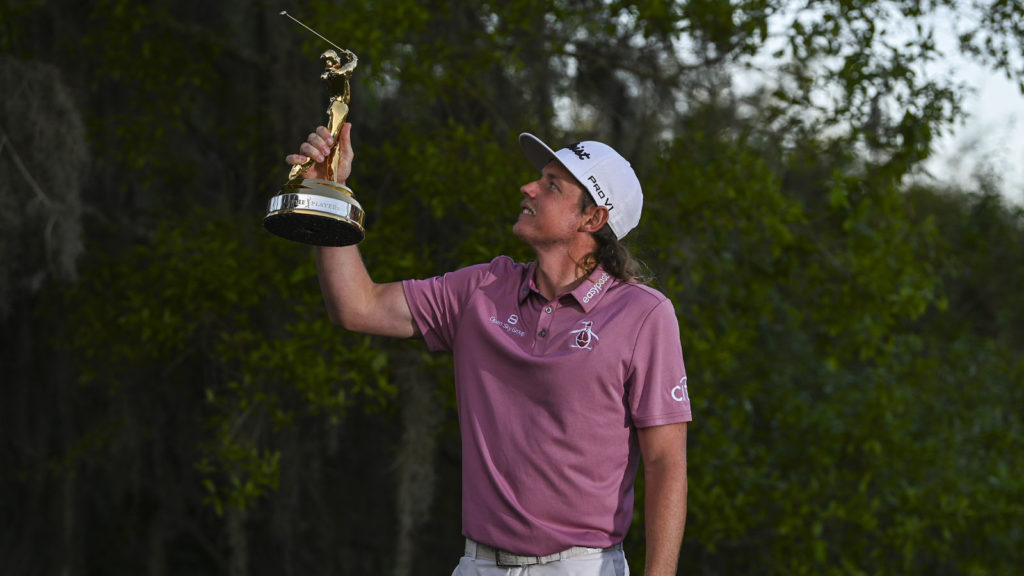Cameron Smith, the No.2 player in the world after his victory at last month’s Open Championship, is rumoured to be leaving the PGA Tour for LIV Golf.
Many Australian golf fans are welcoming this speculation – which is evident from supportive comments on social media – because it has been reported LIV Golf will take one of its tournaments and two Asian Tour events to Australia and Smith could headline them if he does go across.
If it happens, it arguably would be the PGA Tour’s biggest loss to the Saudi-backed circuit in the burgeoning divide in professional golf. Compounding the matter is the fact the 28-year-old is also the No.2 player in the FedEx Cup standings and set to play in the tour’s three-tournament playoffs begins this week in Memphis with the FedEx St. Jude Championship. That puts Smith—who also won the tour’s flagship event, the Players Championship, in March—in great position to win the PGA Tour’s season-long competition and its $US18 million reward, then head immediately to the tour’s new rival.
Tour officials have read the articles you’ve read and have most definitely heard the Australian’s non-denials of those articles, raising the question among some PGA Tour fans: Why hasn’t Smith been suspended from the playoffs?
PGA Tour commissioner Jay Monahan had long promised that any tour member who competes in a tournament on a rival league without a conflicting-event release would face disciplinary measures from the tour. And he has kept his word, suspending those who have jumped to LIV Golf. But until now, those suspensions haven’t become official until players have actually hit a shot in LIV competition, and with reason, explains attorney Tom Allen.

“Playing in a conflicting event seems a little more concrete,” says Allen, who practices in government services, litigation and labor and employment areas, regarding the PGA Tour. “It is similar to making out a conspiracy: People can talk about doing certain things, but once they take a physical action or step in favour of that alleged conspiracy, they have sealed their fate.”
One of the provisions in the PGA Tour Player Handbook and Tournament Regulations is that each PGA Tour member acknowledges the commissioner, the tour’s policy board and the appeals committee have the authority to permanently ban a member from playing in tour co-sponsored, approved or coordinated tournaments if the member violates its regulations. The handbook also states that a player ceases to be a member of the PGA Tour if, in the judgment of the policy board, the member commits a serious breach of the Tournament Regulations, the PGA Tour’s Code of Ethics or otherwise conducts himself in a manner unbecoming of a professional golfer.
According to the antitrust lawsuit filed by 11 LIV golfers against the PGA Tour last week, Phil Mickelson was suspended by the tour in March for recruiting players to LIV. There are many things that can trigger the conduct unbecoming clause, such as poor behaviour, drug use or badmouthing the tour, other players, the commissioner or its sponsors. Very publicly courting a rival tour at a time when the spotlight on the tour is at its brightest could fall under this umbrella.
To date, however, Mickelson is the only known instance in which the tour has suspended a golfer going to LIV before the golfer played in a LIV event. And that precedent appears to be an important one for the PGA Tour moving forward, from a legal perspective. If Smith has already signed a contract with LIV Golf, he could be susceptible to discipline given the provisions in the player handbook. Yet “could” is the operative word; the tour doesn’t have latitude to discipline anyone for anything less than certainty. As multiple attorneys convey, one wrong move could have massive consequences in the tour’s legal battle with LIV Golf. If something isn’t ironclad, the tour will likely have to take the conservative route.
“I am sure both LIV and the player are not sharing their contracts voluntarily, and the PGA Tour doesn’t want to act so severely based solely on rumour,” Allen says. “So without a copy of the player’s contract, or an admission or announcement from the player, or an announcement from LIV, the PGA Tour does not have solid evidence that the player has in fact signed with LIV. That changes once hard evidence in hand: LIV announces it, the player announces it, etc.”
Smith’s participation in the FedEx Cup Playoffs the next three weeks will be a tough swallow for the tour, but Smith more than earned his right by winning three PGA Tour events already this year—the Tournament of Champions in Hawaii, the Players and the Open at St Andrews last month. His third placing at the Masters also helped his FedEx Cup points tally. But while LIV Golf, particularly chief executive and Australian golf great Greg Norman, have been bombastic in their actions and decision-making over the past year, tour officials have been more careful in their communications and word choice. It is not a coincidence: The conservative route, the tour believes, is the way to avoid a litigation disaster.




